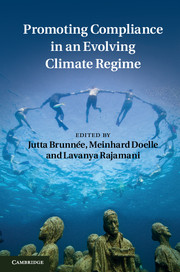Book contents
- Frontmatter
- Contents
- Contributors
- Preface
- Abbreviations
- Introduction: The role of compliance in an evolving climate regime
- Part I Context
- Part II The Kyoto compliance system: Features and experience
- Part III Compliance and the climate regime: Issues, options, and challenges
- 7 The role of non-state actors in climate compliance
- 8 Facilitation of compliance
- 9 Enforcing compliance in an evolving climate regime
- 10 Financial mechanisms under the climate regime
- 11 Post-2012 compliance and carbon markets
- 12 Compliance and the use of trade measures
- 13 ‘Comparability of efforts’ among developed country parties and the post-2012 compliance system
- 14 From the Kyoto compliance system to MRV
- 15 Compliance in transition countries
- 16 Developing countries and compliance in the climate regime
- 17 The role of dispute settlement in the climate regime
- 18 Depoliticizing compliance
- Part IV A look forward
- Bibliography
- Index
- References
16 - Developing countries and compliance in the climate regime
Published online by Cambridge University Press: 05 January 2012
- Frontmatter
- Contents
- Contributors
- Preface
- Abbreviations
- Introduction: The role of compliance in an evolving climate regime
- Part I Context
- Part II The Kyoto compliance system: Features and experience
- Part III Compliance and the climate regime: Issues, options, and challenges
- 7 The role of non-state actors in climate compliance
- 8 Facilitation of compliance
- 9 Enforcing compliance in an evolving climate regime
- 10 Financial mechanisms under the climate regime
- 11 Post-2012 compliance and carbon markets
- 12 Compliance and the use of trade measures
- 13 ‘Comparability of efforts’ among developed country parties and the post-2012 compliance system
- 14 From the Kyoto compliance system to MRV
- 15 Compliance in transition countries
- 16 Developing countries and compliance in the climate regime
- 17 The role of dispute settlement in the climate regime
- 18 Depoliticizing compliance
- Part IV A look forward
- Bibliography
- Index
- References
Summary
Introduction
From relative obscurity in the late 1980s when it was first discussed in the UN General Assembly, the issue of climate change has come, less than three decades later, to be characterized as ‘the defining human development challenge for the twenty first century’. In the decades that the international community has spent in search of a solution to climate change, climate science has gained in certainty, media attention has grown exponentially, and climate consciousness has acquired salience among the political classes. This was in evidence at the Copenhagen Climate Conference, 2009, that attracted 125 heads of state and government, the largest such gathering in the history of the United Nations, and nearly 40,000 participants. No collective challenge facing humanity has ever before attracted such attention, participation and political capital, yet the international community could not resolve its differences and arrive at a definitive formula to address climate change. At the root of the differences are differing self-serving visions of burden sharing among states.
In the early years, the negotiations focused, given the greater contribution of developed countries to the climate change problem as well as their enhanced capacity on generating greenhouse gas mitigation targets, timetables, and compliance mechanisms for developed countries. The gaze has shifted in recent years to the role that developing countries, in particular the more advanced among them, can and should play in addressing climate change. This shift is accompanied by a larger crisis in the climate regime precipitated in part by the United States’ rejection of the Kyoto Protocol, and consequent efforts by other developed countries to transition to a less prescriptive regime that could prove attractive to the United States. These two trends are together likely to lead to a future regime that is less prescriptive for all countries, and therefore has a limited role for compliance systems, whether for developed or developing countries. Nevertheless there are several tools and techniques, short of a fully fledged compliance system, that may be useful in ensuring that states are in compliance with their obligations. This chapter examines the tools and techniques in the climate regime as they relate to developing countries.
- Type
- Chapter
- Information
- Promoting Compliance in an Evolving Climate Regime , pp. 367 - 394Publisher: Cambridge University PressPrint publication year: 2011
References
- 1
- Cited by



